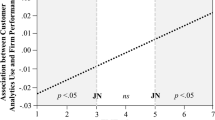Abstract
Customer information plays a key role in managing successful relationships with valuable customers. Big data customer analytics use (BD use), i.e., the extent to which customer information derived from big data analytics guides marketing decisions, helps firms better meet customer needs for competitive advantage.
This study addresses three research questions:
-
1.
What are the key antecedents of big data customer analytics use?
-
2.
How, and to what extent, does big data customer analytics use influence firm performance?
-
3.
Is competitive advantage, if any, achieved through big data customer analytics use contingent upon its prevalence within an industry?
Drawing primarily from market information use theory, we advance a theoretical framework to examine how informational and organizational factors act to enhance big data customer analytics use, which in turn influences customer relationship and financial performance. More specifically, we identify and show how information quality (IQ), big data analytics culture, and customer orientation act as key antecedents of big data customer analytics use, which in turn is the critical mechanism to achieve superior CRM outcomes. Finally, we investigate whether the performance implications of big data customer analytics use vary depending on the prevalence of big data customer analytics use in the firm’s industry.
Empirical findings from a survey of 301 senior marketing executives, representing large US-based firms in B2C industries, support our conceptualization of the performance outcomes and antecedents of BD use. First, the results highlight that the characteristics of the customer information (IQ) and the characteristics of the user organization (customer orientation and big data analytics culture) strongly predict BD use. The findings also reveal the relative importance of different customer information characteristics to marketing decision-makers. Second, the results confirm BD use as a key predictor of firm performance and, more specifically, that big data customer analytics use primarily influences financial performance indirectly via customer relationship performance. Third, this study suggests that the performance impacts of BD use are highly contingent on its prevalence among industry rivals.
Access this chapter
Tax calculation will be finalised at checkout
Purchases are for personal use only
Similar content being viewed by others
Author information
Authors and Affiliations
Corresponding author
Editor information
Editors and Affiliations
Rights and permissions
Copyright information
© 2018 Academy of Marketing Science
About this paper
Cite this paper
Suoniemi, S., Meyer-Waarden, L., Munzel, A. (2018). Big Data-Driven Marketing: An Abstract. In: Krey, N., Rossi, P. (eds) Back to the Future: Using Marketing Basics to Provide Customer Value. AMSAC 2017. Developments in Marketing Science: Proceedings of the Academy of Marketing Science. Springer, Cham. https://doi.org/10.1007/978-3-319-66023-3_53
Download citation
DOI: https://doi.org/10.1007/978-3-319-66023-3_53
Published:
Publisher Name: Springer, Cham
Print ISBN: 978-3-319-66022-6
Online ISBN: 978-3-319-66023-3
eBook Packages: Business and ManagementBusiness and Management (R0)




